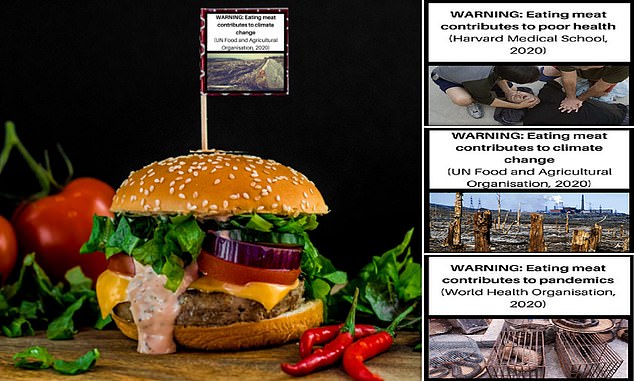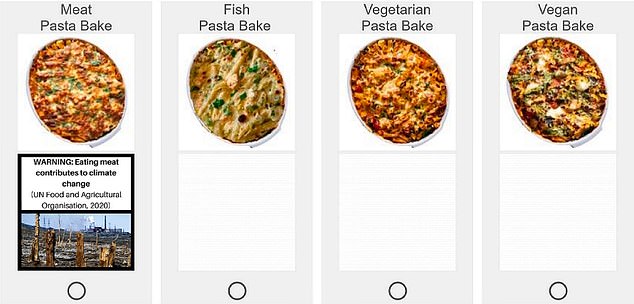Would you buy a burger if it looked like this? Researchers propose putting cigarette-style warnings on MEAT so that people eat less
Placing cigarette-style warning labels on food would reduce the amount of meat people eat, experts say.
Academics from the University of Durham tested similar warnings on 1,000 people and found they could convince up to a tenth of participants to choose a fish or vegetarian option instead.
Warnings that eating meat ‘contributes to climate change’ or ‘poor health’ were the most effective messages, the results showed.
Telling consumers that eating meat could potentially cause pandemics was considered the least credible of the three options tried, despite having a similar effect.
The researchers said eating a lot of meat is ‘bad’ for your health, and studies show that too much meat can increase the risk of cancer and heart disease.
Scientists have also claimed that meat production and consumption is fueling climate change because the industry emits a large amount of greenhouse gases.

Academics from the University of Durham tested similar warnings on 1,000 people and found they could convince up to a tenth of participants to choose a fish or vegetarian option instead. Warnings that eating meat ‘contributes to climate change’ or ‘poor health’ (right) were the most effective messages, results showed

They were presented with twenty different hot meals, such as burgers, pasta dishes or pizzas, all of which were available in meat, fish, vegetarian and vegan forms. Volunteers were divided into four groups, with the meat option carrying no label or a label stating that eating meat contributes to ‘poor health’, ‘climate change’ (pictured) or ‘pandemics’.
Warning labels could ‘reduce these risks’ and help Britain ‘reach net zero’ if introduced at national level, they claimed.
The researchers recruited a representative sample of 1,001 people, who were asked to imagine they were sitting in a cafeteria.
They were presented with twenty different hot meals, such as burgers, pasta dishes or pizzas, all of which were available in meat, fish, vegetarian and vegan forms.
The volunteers were divided into four groups, with the meat option either carrying no label or a label stating that eating meat contributes to ‘poor health’, ‘climate change’ or ‘pandemics’.
Volunteers were asked to choose which meal they would choose.
They also reported how frightening and believable they found the labels, whether they would buy the meals in the future and how attractive the foods were.
Participants also indicated how positive they would be about the various labels if they were implemented as policy.
Results, published in the journal Appetite, show that all labels were effective in discouraging people from choosing meals with meat.
Health-related labels reduced the choice of meat meals by 8.8 percent, climate labels by 7.4 percent and pandemic labels by 10 percent.
However, the researchers said there was no statistically significant difference between the groups, meaning they would all have a similar effect.
The responses also showed that participants felt the climate warning labels were “most credible.”
Although the pandemic labels evoked the most negative emotions, they were also perceived as ‘less credible’.
Participants were indifferent about introducing climate warning labels on food, but opposed the introduction of health and pandemic warning signs, the results showed.
They were asked to vote on a seven-point scale whether they strongly opposed the policy (one point) or strongly agreed with it (seven points).
Overall, health and pandemic warnings scored 3.5 and 3.4 points respectively, while climate warnings scored an average of 3.88 points.
Jack Hughes, author of the study and PhD candidate in behavioral sciences at the university, said: ‘Achieving net zero is a priority for the nation and the planet.
‘As warning labels have already been shown to reduce both smoking and drinking sugary drinks and alcohol, the use of a warning label on meat-containing products could help us achieve this if introduced as national policy.’
Dr. Milica Vasiljevic, associate professor of behavioral sciences at the University of Durham and senior author of the study, said: ‘We already know that eating a lot of meat, especially red and processed meat, is bad for your health and contributes to deaths due to pollution. and climate change.
‘Adding warning labels to meat products could be one way to reduce these health and environmental risks.’
About three-quarters of British people eat meat.
Health leaders note that it is a good source of protein, vitamins and minerals.
However, they recommend choosing the leanest option, choosing skinless meat and grilling it instead of frying it to reduce the fat content.
And people should eat no more than 70 grams of red or processed meat per day, as this increases the risk of colon cancer.
The researchers noted that “excessive” meat consumption is linked to obesity, cardiovascular disease, infertility, diabetes and cancer.
They also pointed to research showing that meat production in China has been linked to 90,000 pollution-related deaths, while in the US it has been linked to 13,000.
Meanwhile, meat production, agriculture and consumption have been linked to zoonotic diseases such as Covid, they said.

